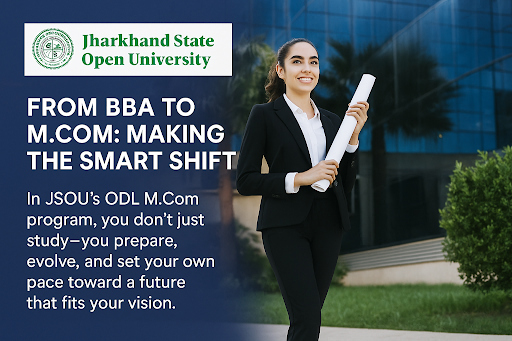Written By: Jharkhand State Open University Editorial Team

Completing your M.Com isn't just the end of your academic journey—it's the start of something bigger. This degree deepens your understanding of finance, taxation, economics, and corporate strategy, equipping you with the tools to make informed, real-world business decisions. It's a launchpad, not a finish line.
After completing MCom what can I do? You can lead finance teams in corporate settings, help businesses stay tax-compliant, support government bodies in economic planning, or even teach and mentor the next generation. You can also take competitive exams like UGC-NET to qualify for assistant professorships or go global with certifications like CPA or CMA. The M.Com gives you choices—smart, strategic, and future-proof.
The power of an M.Com lies in its flexibility. Once you've earned the degree, you're not locked into a single path—you're free to build one that reflects your interests, whether it's research, industry, or entrepreneurship.
If you're asking yourself, what can I do after MCom, take time to evaluate where your passion lies. Are you interested in exploring market trends and analytics? Consider roles in data-driven finance. Want to shape policy? Look at research roles or think tanks. Enjoy teaching? A PhD or NET qualification could be your next step. Whatever direction you choose, your M.Com lays the groundwork for lifelong professional development.
It's common to wonder about return on investment, especially when it comes to further education. So, what is the salary of B Com graduates, and does moving on to M.Com make a difference?
A B.Com degree typically leads to entry-level roles in accounting, banking, and sales with average salaries ranging from ₹2.5 to ₹4.5 LPA. It's a good start, but often not enough to reach leadership or specialised positions. That's where an M.Com comes in. With advanced knowledge and a postgraduate qualification, your eligibility widens—and so does your income potential. M.Com graduates can secure roles that start around ₹5–6 LPA, especially in areas like tax consultancy, business analysis, and cost accounting, with higher salaries over time as you gain experience.
If you're coming from a business management background, you might be asking, after BBA can I do MCom? Yes! You absolutely can. In fact, this combination of a managerial foundation (BBA) followed by technical expertise (M.Com) can give you a competitive edge.
At Jharkhand State Open University (JSOU), the ODL Master of Commerce (M.Com) is designed for learners from diverse academic streams, including BBA graduates. This path enables you to build on your understanding of business concepts while gaining deeper financial insight, preparing you for roles that combine strategic thinking and operational control. And since the program is offered through Open and Distance Learning, it's ideal for students who want to keep learning while working, preparing for exams, or exploring career opportunities in parallel.
In today's competitive world, what you do after graduation matters—but how you think about it matters more. Your M.Com is more than a degree; it's a statement of intent. Whether you're planning to dive into the corporate world, enter public service, or build your academic legacy, choosing the right direction starts with the right mindset—and the right university.
With JSOU's ODL M.Com program, you don't just study—you prepare, evolve, and set your own pace toward a future that fits your vision.
Our counselling team is ready to assist you at every step — click the button below to get started.
Need advice? Our experts are on WhatsApp 24/7—message us anytime!
Copyright © 2025 - All Rights Reserved - Jharkhand State Open University